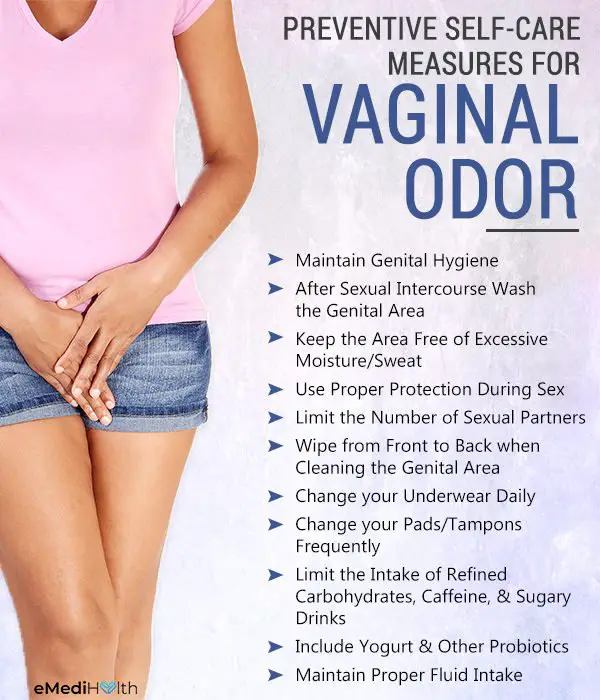Not All Vaginal Odor Means Trouble
Like any other body part, the vagina has a smell. Vaginal odor, along with discharge, is completely normal and is usually nothing more than a sign of good health. Familiarizing yourself with how your vagina typically acts and smells will help you detect changes that might indicate illness or infection.
Normal vaginal odor might smell like:
Tangy or fermented: The natural pH of a vagina is acidic, similar to coffee, wine, or apple juice. Normal vaginal pH can range from 3.8 to 4.5 on the pH scale. The vagina coincidentally also carries the same bacteria found in yogurt, lactobacilli, which keeps its pH low and helps to prevent the growth of the bad bacteria.2
A sour, tangy smell reminiscent of yogurt or sourdough bread is a good thing its a sign that your vagina has a healthy pH level and lactobacilli presence. You may also notice a tangy smell after sex, which could be a combination of sweat, other bodily fluids, and semen. Because semen has a higher pH than the vagina, it can sometimes temporarily change the scent of your vagina .
Coppery: A metallic smell could be a sign of blood and is common when you are near the menstrual stage of your cycle. It could also be a sign of bleeding after sex, which isnt necessarily a cause for concern. However, if its constant, you should consider telling your doctor or health provider and ask for a Pap smear.3
What about discharge?
Changes In The Ph Levels
The normal pH level of the vagina is between 3.8 and 4.5, which is in the acidic range. This acidic pH is caused by beneficial bacteria or natural vaginal flora that lives in the vagina and produces lactic acid. During pregnancy, the excess blood supply to the vaginal region causes this pH to change. This makes the vagina vulnerable to bacterial infections such as vaginitis and can lead to fishy or foul-smelling discharge from the vagina.
Abnormal Vaginal Odor: When To Get Checked Out
If your vagina or vaginal discharge has a very noticeable odor, including after sex, it may be a sign of infection. Keep an eye out for discharge that changes significantly in color or amount, or is accompanied by any of the following symptoms:4
- Burning
- Pain during urination or sex
- Any sort of swelling or discomfort
These symptoms may be accompanied by a change in vaginal odor. If youre noticing any of the above, give your healthcare provider a call to get checked out. Below are a few ways to describe vaginal odor that could be problematic :
Chemical or bleach-like: Bacterial vaginosis will sometimes cause vaginal odor thats similar to the smell of bleach. This is not in itself perfect evidence of infection, since buildup of urine in underwear or around the vulva can also smell like ammonia.
Foul and/or fishy: A low tide smell coming from the vagina should be regarded with the same level of suspicion as fresh fish that smells strongly fishy. Trimethylamine, the chemical compound responsible for the smell of rotting fish, is actually found in the vagina when certain infections are present. Bacterial vaginosis and trichomoniasis , an STI, are the two most common culprits behind fishy vaginal odor.5
Read Also: Can You Donate Plasma When Pregnant
Does Your Vag Smell Different When Pregnancy
Does your VAG smell different when pregnancy? Your vaginas pH levels changeA change or increase in odor while likely occurring because of your fluctuating hormones may also seem more pungent to you because your olfactory senses are also heightened during pregnancy.
Is it normal to smell down there while pregnant? Sometimes you can smell yourself vaginally, especially toward the end of pregnancy, Hoover says. It could be because you have more mucus then. Some people get worried about the odor and bring wet wipes wherever they go.
What do you smell like in early pregnancy? Why? Because as strange as it might sound, moms-to-be are known to have an uncanny sense of smellin fact, its often one of the first signs of pregnancy. So if youre suddenly gagging at the scent of garlic or ground beef , you might just be expecting.
Do you get a fishy smell when pregnant? Bacterial vaginosis : According to the American Pregnancy Association, 10 to 30 percent of pregnant women will get bacterial vaginosis. The condition is caused by an imbalance of good and bad vaginal bacteria. The main symptom of BV is a fishy-smelling, gray discharge.
What Causes Vaginal Odor

Abnormal vaginal odor can be caused by infection or inflammation. When the normal vaginal bacteria levels are imbalanced, this can lead to vaginitis.
Specific causes include:
- Bacterial vaginosis: An infection that occurs from an overgrowth of normal of vaginal bacteria. The most common cause of vaginal odor.
- Trichomoniasis: A sexually transmitted infection.
- Rectovaginal fistula: A rare condition in which an opening between the rectum and vagina allows feces to leak into the vagina.
- Vaginal cancer: Symptoms include heavy vaginal discharge that can have a strong odor.
- Cervical cancer: Symptoms can include a strong discharge. Cancer is a rare cause of abnormal vaginal odor.
However, temporary vaginal odor is common, and often resolves on its own. This can be due to hormonal changes, or even diet. For example, foods with a strong odor, such as garlic or fish, can cause odor changes in the vagina.
Read Also: Can You Do Lasik While Pregnant
What Is Vaginal Discharge Like During Pregnancy
Heres the lowdown on vaginal discharge during pregnancy: why it happens, what it looks like, how to deal with it and when to get it checked by a doctor
Pregnancy can be a juicy timeand were not talking about is she or isnt she? gossip. Some women might notice extra saliva, a runny nose and, yes, more vaginal discharge. Its just a normal thing that happens during pregnancy, says Kerry Harris, a midwife based in Vancouver. This kind of pregnancy-related vaginal discharge is called leukorrhea. Though it can be common throughout the entire pregnancy, it can be one of the early-pregnancy symptoms and often increases more toward the end of the third trimester.
When To See A Health Care Provider For Fishy Vaginal Odor
If you have a fishy vaginal odor that wont go away even after trying the techniques above, its time to see a health care professional. This is also true if the fishy vaginal odor comes with any itching, burning, or bleeding.
Still have questions about fishy vaginal odors? Never fear, because Flo is here to answer them all.
Read Also: What Happens If You Donate Plasma While Pregnant
What Causes Vaginal Smell During Pregnancy
A strong vaginal odour during pregnancy may be due to altered pH balance, sweat, infections, hormonal and dietary changes, etc. If the cause is not a medical condition, then the odour will disappear once you deliver the baby. Women who are not pregnant can also have a smelly vagina because of sweat and dietary changes.
Various causes of vaginal odour include the following
Should I Be Concerned About A Fishy Vaginal Odor During Pregnancy
While pregnant, a fishy odor either in your urine or vaginal discharge is a potential sign of a urinary tract infection or BV. Left untreated, the condition could lead to preterm birth or low birth weight.
Following childbirth, the development of a fishy vaginal odor may be from a postpartum infection. Please make an appointment to see your health care provider to follow up.
Also Check: Can Donating Plasma Affect Getting Pregnant
Find Out How To Spot The Early Signs Of Pregnancy
Just when you think everything that could be said and written about when it comes to pregnancy and birth has been covered, heres a surprising fact youve probably not considered. Pregnancy and birth, even the newborn period, has its own range of smells. Some could be described as unique and pleasant and others less so.
But its true to say that smell plays an important role in this whole baby growing and birthing business.
Want to join the family? Sign up to our Kidspot newsletter for more stories like this.
Causes Of Vaginal Odor During Pregnancy
There are a variety of reasons why you may be experiencing vaginal odor during pregnancy.
The physiologic vaginal discharge during pregnancy is known as leukorrhea. This is a thin, white discharge that feels wet. While you may feel like your odor slightly changes, it should not smell foul and it should not itch or cause pain. Leukorrhea is caused by an increase in pregnancy hormones and blood flow to your reproductive organs.
Editor’s Note:
Lets take a look at some of the most common causes:
Also Check: Can You Get Lasik Eye Surgery While Pregnant
Always Carry Tissue With You
During traveling you may not find places with the best hygiene surrounding, like public washrooms which may cause infection. Having your own set of tissues can help you to clean the toilet seat and also clean your genitals. Doing so reduces the risk of infections that may cause vaginal diseases. Although every place offers toilet wraps or tissues, they are already used by unhygienic hands so using your own may be helpful in such times to keep your vagina clean and smell normal.
Everything You Need To Know About Vaginal Discharge During Pregnancy

Vaginal discharge during pregnancy is completely normal. Learn more about ordinary vaginal discharge, smelly vaginal discharge and other changes that can happen during pregnancy.
Before you read on, did you know that you can sign up to receive the latest Supersavvyme articles, tips & tricks and competitions? Register here.
Its not the most glamorous of subjects, but vaginal discharge is a fact of life. All women have some vaginal discharge. It starts in the year or two prior to puberty, and continues throughout life, coming to a stop after the menopause. Vaginal discharge during pregnancy is completely normal, and helps prevents infections reaching the uterus from the vagina. We answer all your questions about vaginal discharge during pregnancy
What sort of vaginal discharge during pregnancy can I expect?
Don’t Miss: Lice Treatment During Pregnancy
How Can Vaginal Discharge During Pregnancy Suddenly Change
Vaginal discharge during pregnancy might change in colour. becoming yellow, green or grey. Or it might be an odour change, becoming strong or bad, so you might notice smelly vaginal discharge. The amount or consistency might change, or it could start causing pain, itching or burning.
You should see a doctor if you experience any of these changes to vaginal discharge during pregnancy because they may indicate an underlying problem like an infection, or the vaginal discharge may be amniotic fluid.
Your Pregnant Vagina May Fart
There’s not a whole lot of medical literature on the delicate topic of vaginal farting. But here’s what it is: A trapped pocket of air in the vagina gets pushed out and makes an I-just-passed-gas kind of noise. “It’s not a sign of anything bad,” says Dr. Bolt. And though it’s unclear why pregnancy can cause this to happen more frequently, it’s likely a combination of your growing belly, different intercourse positions, exercise, and over-worked pelvic floor muscles.
Recommended Reading: Tums While Pregnant
Feminine Hygiene Best Practices
The first thing to remember is that many vaginal odors are signs of a healthy vagina. But if youre looking to minimize those odors, here are a few tips to consider:
- Do not use douches, unless instructed by your doctor. Douches and other products like feminine deodorants and sprays can alter a healthy vaginas pH levels, causing an overgrowth of harmful bacteria, leading to infection.
- Wash your vaginal area with warm water and a small amount of mild unscented soap.
- Concerning sexual intercourse: use a condom to prevent contact between semen and vaginal fluids use only unscented and non-flavored lubricants.
- Consider wearing cotton underwear, which is less likely to hold moisture and makes it more difficult for smell-producing bacteria to build up.
- Avoid tight-fitting clothing, including thongs, which can collect fecal matter that can reach the vagina and cause infections and odors.
- Consuming probiotics like yogurt can help prevent yeast infections and reduce vaginal odor by keeping your vaginas pH levels in order.
- Staying well-hydrated helps keep bacterial overgrowth and stress-related sweat in check.
- See your Moreland OB-GYN doctor annually for your wellness visit and in between if you have any concerns.
What Physical Changes Can I Expect After Delivery
Lochia
Lochia is the vaginal discharge you have after a vaginal delivery. It has a stale, musty odor like menstrual discharge. Lochia for the first 3 days after delivery is dark red in color. A few small blood clots, no larger than a plum, are normal. For the fourth through tenth day after delivery, the lochia will be more watery and pinkish to brownish in color. From about the seventh to tenth day through the fourteenth day after delivery, the lochia is creamy or yellowish in color.
You might notice increased lochia when you get up in the morning, when you are physically active, or while breastfeeding. Moms who have cesarean sections may have less lochia after 24 hours than moms who had vaginal deliveries. The bleeding generally stops within 4 to 6 weeks after delivery. You should wear pads, not tampons, as nothing should go in the vagina for six weeks.
Incision drainage
If you had a C-section or tubal ligation, it is normal to have a small amount of pink, watery drainage from the incision. Keep the incision clean and dry. Wash the incision with soap and warm water. You can bathe or shower as usual. If the drainage doesnt stop, call your healthcare provider.
Breast discharge
When you are breastfeeding, your breasts may leak fluid. If you are unable to breastfeed, the leaking may occur initially and will stop within 1 to 2 weeks after delivery. Breast pads, worn inside your bra, may help keep you dry.
Breast engorgement
Discomfort in the perineal area
Perineal care
You May Like: Can I Use Vagisil Wash While Pregnant
Your Vagina Will Produce More Discharge
Stock up on panty liners. Shortly after conception and often before you even realize youre pregnant, your private parts go into hormonal overdrive, producing more discharge to keep your cervix protected and to help prevent infections.
The technical term for this discharge is leukorrhea, and it should be relatively thin in consistency, have a milky color, and smell mild similar to your normal discharge, only heavier, more frequent, and stickier.
If, however, it takes on a yellow or green color, looks thick, or smells foul, you may have an infection and need antibiotics. Later in pregnancy, you may also lose the gooey mucus plug on your cervix, which indicates that labor is coming.
Itchiness In The Vagina
Of all the body parts you would want to itch during pregnancy, your vagina is probably last on the list. Sadly, vagina itching is common during pregnancy. It is a result of changes in pH levels, increased vaginal discharge, and pregnancy hormones.
Pregnancy hormones are responsible for increasing vaginal bacteria, which often leads to yeast infection and bacterial vaginosis. Yeast infections are common in women, particularly pregnant women. This is because of the changes in pH levels and increased estrogen levels. Pregnant women with bacterial vaginosis have a grayish-white discharge, while those with yeast infection have a yellowish-white discharge. These two can be extremely itchy, but luckily, they are treatable by a medical professional.
Don’t Miss: Risks Of Donating Plasma While Pregnant
Is Vaginal Odor Natural
Yup! When you look at whats normal, it can have a mild or slight odor thats not unpleasant, Dr. Streicher says. There shouldnt be a strong odor, and it shouldnt smell like the zoo or fish. So if you feel like your discharge smells bad but not fishy or like a musky animal, youre probably okay.
Vaginal odor is like sweateveryone has their own scent, Dr. Shepherd says.
You Could Experience A Swollen Vagina During Pregnancy

That extra blood flowing through your vaginal area can make your lady parts feel full and heavy, says Dr. Bolt. Your vagina won’t actually appear swollen, but it might feel that wayand that’s not always such a bad thing. “For some women, the extra blood supply increases sensation,” says Dr. Rosser. In other words, a swollen vaginal area during pregnancy could leave you saying, “Hello, orgasms!”
Don’t Miss: Vagisil While Pregnant
What Does Yellow Discharge Mean 6 Common Causes
Shelby Hale
Katerina Shkodzik
M.D., OB-GYN
We all know that its normal to have vaginal discharge. But what happens if that discharge is a color other than white or clear?
In this article, we will be focusing on yellow discharge, including when its normal, when its not normal, and when you should seek advice from your doctor.
Is It Normal To Have Yellow Discharge During Pregnancy
Yellow smelly discharge is an abnormal discharge and requires treatment. It is mostly due to a vaginal infection. If yellow smelly discharge occurs in pregnancy, it can cause miscarriage or preterm delivery if not treated early. 2. Brown smelly discharge Normal: Brown discharge is a normal kind of discharge experienced by women.
If your yellow discharge has no odor, this is a good indication that you probably dont need to worry. Discharge with a smell hints to an infection of some sort, which means that if you have yellow discharge without odor, it may be yellow due to factors other than infection.
Chlamydia, gonorrhea, trichomoniasis, bacterial vaginosis, and severe yeast infection may cause you to have a yellowish discharge. This article explains why you have yellow discharge no odor, when its abnormal and when you must talk to your doctor about your symptoms.
Recommended Reading: Can I Use Vagisil Wash While Pregnant

